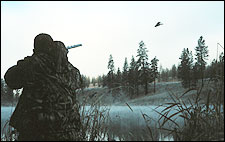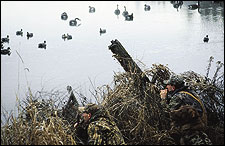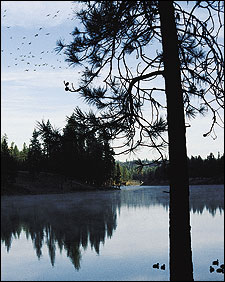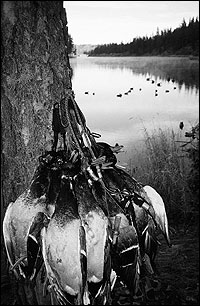November 03, 2010
By Ed Given
Mallards Provided Morning Magic On A Lonely Western Stream
By Ed Given
 Barry Lauderdale swings on a greenhead that responded to his calling. |
"My, you must of had a nice weekend," remarked the Southwest Airlines flight attendant, "judging from the smile on your face."
"Thank you," I replied. "That I did." I didn't explain that my wife refers to my smile as the "silly grin" I display every time I've had a great outing. I was on my way home to California from Spokane, Washington, after experiencing two of the fastest and most exciting days of waterfowling for river mallards I could have imagined.
My youngest son, CJ, had called me two weeks earlier to report duck numbers were building in the areas he hunts near Spokane. He suggested I come up and sample the gunning. Actually, he didn't come across quite that calmly. It was more like, "Get up here--the sooner the better! We slayed 'em again this weekend, and the northern birds aren't even here yet!"
Advertisement
Since graduating from college and moving to the Spokane area four years ago, CJ has been tempting me with tales of great waterfowling. You know the routine--phone calls followed up with pictures of straps chock full of red-legged mallards or strained faces holding up four-bird limits of white-cheeked geese. After CJ's latest round of sky-full-of-bird stories, I got on the Internet, found some airplane tickets I could afford and two weeks later I was Spokane bound.
When I landed in Spokane on Friday, it was cold. The high for the day was in the low 30s, with light winds, and supposed to be colder the next day. What a shock, as Washington and the rest of the Western states had been in the grip of mild weather. The abrupt change had CJ and our close friend, Barry Lauderdale, scratching their heads for a hunt location.
Originally, Barry and CJ's plans had been for us to hunt a pothole region south of Spokane on Saturday morning. They had done well there on the previous weekend, so it was the obvious starting spot. Sunday's plans were to be made after Saturday's results were in. Now ponds, potholes, backwaters and even some small impoundments were frozen tight with the sudden cold front. A new game plan had to be formed to try and get me into some birds. They decided to try the Spokane River, as they knew its waters would be ice free and birds should be moving there from frozen inland waters. Daybreak found us huddled behind hastily constructed blinds, shivering both from the cold and, I suspect, in anticipation of the hunt. The day was crystal clear, with air temperatures in the high teens.
Advertisement
Legal shooting time came and went. We had not seen a duck. Suddenly, almost magically, five ducks were spotted in the early morning light. Flying along the far shore, their slow wing beats indicated they were looking for a resting spot. So we hastily greeted them with a series of high balls and soft quacks. Immediately a gravel-voiced "Suzie" answered and then in unison the fivesome banked our way, descending on cupped wings and, finally, with feet down.
As the three of us stood to greet them, guns barked out lethal greetings of Federal steel and just that quickly we had two fat greenheads floating on the river's surface. CJ chose not to fire, as he could not pick out a drake in the early light.
 Barry Lauderdale and CJ Given tense up as ducks respond to their calling. |
As CJ's Chessie, Grizz, swam to shore with the second of our two mallards, a larger group caught us by surprise. Coming in from behind us and literally trying to land on Grizz's head, I'm sure the water disturbance caused by Grizz's swimming in the early light attracted the birds.
Quickly we again scrambled to our feet, each picking out a bird, and just that quickly we had three more drakes floating on the river. Somehow, I was no longer cold. I could almost feel the sighs of relief from my two "guides" as they admitted to a genuine concern for today's choice of hunting location.
Earlier in the morning darkness, after our decoys had been placed, we had all strained to hear duck sounds. As shooting time had drawn closer, we still had not heard a single brash hen quack or an overhead whisper of wings.
As CJ took the last mallard from Grizz, we began to make out flights of ducks high overhead. Barry spied some birds landing further down river, and I suddenly caught movement upriver. The pair of mallards drew a series of hail calls from us, and they quickly responded and headed our way.
As we continued to call the twosome from upstream, a silent group of 12 to 15 ducks suddenly were upon us, apparently coming from the opposite direction in answer to our calling. We sat there spellbound for a few seconds as the big ducks began landing in our dekes.
Surprised as we were, we didn't forget to jump to our feet and greet the descending birds. As we each carefully picked out greenheads, we opened fire. It was mass confusion! Ducks were still descending, while others were springing from the water in their haste to depart. My chosen greenie humped up from the first shot, but kept climbing. As I swung on him for my follow-up shot and punched the trigger, he crumpled and fell with a resounding splash. With calm momentarily restored, I found that both CJ and Barry had doubled, and Grizz was already attempting to retrieve my bird, which fell the farthest out into the river. Barry gave me the needle for not doubling, while CJ greeted Grizz with every retrieve before directing him to another bird.
While all this activity was going on, a single drake banked and came our way. Upon hearing our calling. As he tried to land in front of us, Barry yelled, "Take him, Chief!" Following my "guide's" advice, I did as I was told and took him.
 A large group of mallards circle overhead on the river. |
Duck hunting should never be this fast and furious but, unbelievable as it may seem, more ducks were heading our way, low and with obvious intent of joining our dekes. As Barry and I rolled out a greeting, CJ wisely shouted, "Don't shoot anymore until Grizz recovers the birds we have down." We just stood and and watched the foursome flare and depart unscathed.
What followed was a steady procession of mallards.
We never saw another duck species. There were groups of three to five and squadrons of 10 to 30 ducks almost always in sight somewhere. It seemed as if there were constantly birds circling overhead, with almost every group responding to our calling, at least for a look. It was as if every duck we saw was looking for some companionship. We decided to take turns shooting, being careful to pick out drakes only. When I dropped my fifth duck, I elected to take a break and get a few photos before the action died.
After CJ and Barry limited out, I exchanged camera for shotgun and quickly finished up with my two remaining drakes of my seven-bird Pacific Flyway limit. Unbelievably, a check of the watch showed it was just 7:30 a.m. In just 40 short minutes we had limited out with 21 greenhead mallards.
Grizz was pooped but loving it, and we were giddy with our success. We had not lost a bird, as we constantly had mallards landing in the openings in front of our blind. A parade of ducks was still in the air when we finished picking up our decoys. We sat and watched for some time, in wonderment and with itchy fingers, counting the hours until the next morning.
As we shouldered our decoy bags and prepared for the walk back up the hill to our vehicles, we knew we had just been part of a special waterfowl day. Obviously, the freeze of the past two days has concentrated large numbers of ducks from surrounding, frozen inland waters, to the open waters of the Spokane River. We couldn't wait for tomorrow, as we knew where we would hunt. When CJ and I awoke on Sunday morning, we were greeted by two inches of new snow with more falling. As we drove to meet Barry, we wondered out loud what effect, if any, the snow would have on the hunt.
As daylight arrived, we discovered a new set of rules would be in effect. There were plenty of ducks in the air but, for the most part, they were now organized into large groups and high in the sky. Most appeared to be flying out away from the river. Apparently the ducks had not gone out to feed during the night, as they often do, and they must have been leaving to feed now as the snow abated with the dawn of the new day. It quickly became apparent we would not have a repeat of yesterday.
Ten minutes into our hunt, a pair of mallards finally respond to the pleading of our calls, and the boys let me take the drake. As the morning wore on, we began to pickup a bird now and then but did not enjoy the furious frenzy of the day before. Most often the birds trading up and down the river were singles and small groups, and they were not as eager for companionship as they had been on Saturday.
 Three-man limit of greenheads, taken on a cold day on the Spokane River. |
About 8:30 a.m., some larger groups began flying along the river, with some paying their respects to our calls and spread. We found it took a great deal of pleading to turn the birds.
Slowly but surely the duck numbers on our straps increased. We had some quiet moments, but for the most part there were birds visible to the eye, and at least enough responded to our calling to keep up our interest.
When CJ and I rose up from behind our hide to greet a small group of descending birds, we each quickly picked out a fat drake and crumpled it. A glance at my watch showed it was almost 9:30 a.m. and we had just completed our two-bird limits. Barry was behind us recording the action on video, after limiting out earlier.
After the furious display on Saturday, Sunday morning's action had seemed slow, yet both had been great shoots by any standard. How often can you select your birds and still be finished in so short a time?
In reality, we may never have another hunt where the action is almost nonstop as it was with Saturday's day of frenzy. As for Sunday, it was the kind of hunt all waterfowlers hope to have a few times each season. With birds visible most of the time and enough willing to drop by and stay for dinner, we had experienced another great mallard day.
In retrospect, the sudden freeze was a blessing. I have no doubt CJ and Barry would have gotten me into some ducks no matter where they had chosen to hunt, but not in their wildest dreams could they have pictured the concentration of ducks we had found Saturday. Those mallards had acted as if they hadn't seen another duck in months.
The most amazing thing to me, coming from California, was that we had not seen another hunter. We'd heard shooting in the distance on both days, but that was as close as we came to other hunters in two days of gunning. The area we hunted was state land, open to the public. There are miles of such land on the Spokane River and other waterways in the state of Washington. With a little researching, a waterfowler could have many options for a day's hunt and never overshoot an area.
As I drove home from the San Jose airport, I couldn't help but think how lucky people are who live in uncrowded, wildlife-rich areas. Areas where land is not gobbled up by clubs and outfitters. Areas where sportsmen willing to knock on some doors, shake a few hands or drive a few miles, can still find a great outdoor experience. I now have an excuse to get back and try the pothole region my son brags about. But you can bet one of my first questions when I get off the plane will be, "How has the river shooting been?"

